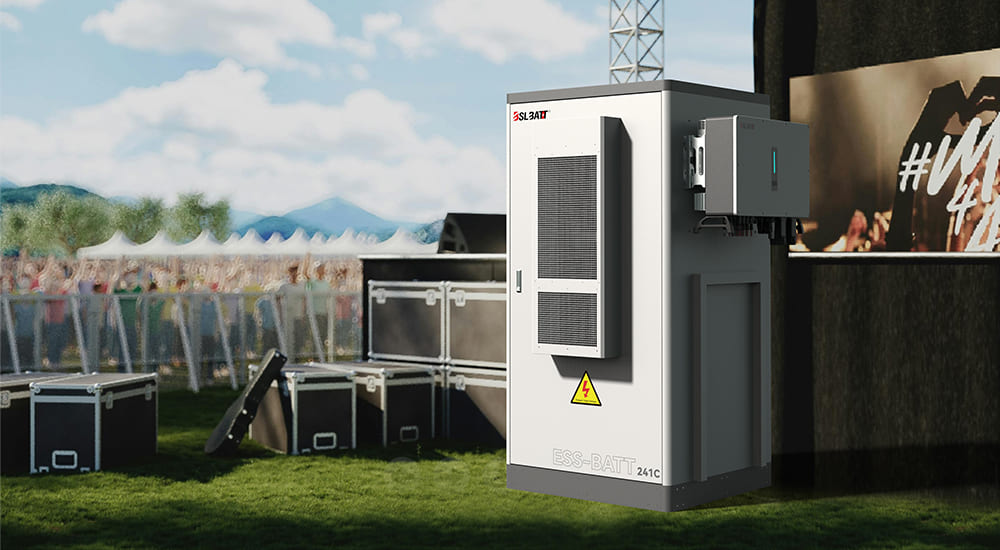تصور ڪريو ته هڪ پوري صنعتي ڪمپليڪس کي بيٽري سسٽم سان بجلي ڏني وڃي جيڪا نه رڳو اعليٰ ڪارڪردگي فراهم ڪري پر حفاظت، استحڪام ۽ قيمت جي ڪارڪردگي جي ضمانت پڻ ڏئي.ڪمرشل بيٽريونڪيترن ئي بنيادي گهرجن کي پورو ڪرڻ گهرجي: انهن کي مستحڪم ڪارڪردگي ڏيکارڻ، ثابت ٿيل حفاظتي معيارن تي عمل ڪرڻ، ماحولياتي دوستي کي اپنائڻ، ۽ اثرائتي زندگي جي چڪر جي انتظام ذريعي اقتصادي ڪارڪردگي کي يقيني بڻائڻ جي ضرورت آهي.
بنيادي طور تي، اعليٰ معيار جون ڪمرشل بيٽريون لازمي طور تي:
- صنعتي ايپليڪيشنن ۾ مسلسل توانائي پهچائڻ.
- سخت حفاظتي معيارن (مثال طور، UL، IEC ۽ CE سرٽيفڪيشن) کي پورو ڪريو ته جيئن اوور هيٽنگ ۽ شارٽ سرڪٽ جهڙن خطرن کي روڪي سگهجي.
- گهٽ اخراج ۽ وڌيڪ ري سائيڪلنگ تي زور ڏيندي ماحول دوست بڻجو.
- انهن جي پوري آپريشنل عمر دوران قيمتي اثرائتي حل فراهم ڪريو.
ايندڙ حصن ۾، اسين ڪمرشل بيٽرين جي بنيادي تصورن کي ڳوليندا، ڪارڪردگي ۽ ڪارڪردگي جي گهرجن جو تجزيو ڪندا، حفاظتي معيارن ۽ معيار جي ڪنٽرول جي قدمن جو جائزو وٺندا، ۽ ماحولياتي استحڪام، اقتصادي فائدن، ۽ سار سنڀال جي حڪمت عملين تي بحث ڪندا. ڇا توهان صنعت ۾ نوان آهيو يا بيٽري ٽيڪنالاجي ماهر، هي جامع گائيڊ - ڊيٽا تي ٻڌل بصيرت ۽ حقيقي دنيا جي مثالن سان - توهان جي ڪاروباري ضرورتن لاءِ بهترين بيٽري حل چونڊڻ ۽ منظم ڪرڻ ۾ مدد ڪندو. اهو ڳولڻ لاءِ پڙهو ته توهان پنهنجي توانائي اسٽوريج سسٽم کي ڪيئن بهتر بڻائي سگهو ٿا ۽ صنعتي ڪاميابي کي ڪيئن هلائي سگهو ٿا.
ڪمرشل بيٽرين جا بنيادي تصور
ڪمرشل بيٽريون توانائي اسٽوريج ڊوائيسز آهن جيڪي صنعتي ۽ ڪمرشل سيٽنگن ۾ وڏي پيماني تي استعمال ٿينديون آهن. انهن ۾ مختلف قسم شامل آهن، جهڙوڪ:
- ليڊ ايسڊ بيٽريون: گهٽ قيمت ۽ پختو ٽيڪنالاجي جي ڪري بيڪ اپ پاور لاءِ پسنديده آهن.
- ليٿيم بيٽريون: اعليٰ توانائي جي کثافت ۽ ڊگهي سائيڪل جي زندگي لاءِ قابل ذڪر، موبائل ۽ قابل تجديد توانائي جي ايپليڪيشنن لاءِ مثالي.
- نڪل-ميٽل هائيڊرائيڊ بيٽريون: ڪجهه خاص ايپليڪيشنن ۾ مخصوص فائدا پيش ڪن ٿيون.
اڄ جي ترقي پذير بيٽري ٽيڪنالاجي جي منظرنامي ۾ اهي بيٽريون نه رڳو روايتي صنعتي سامان ۾ پر سمارٽ گرڊ، توانائي اسٽوريج سسٽم، ۽ برقي گاڏين ۾ پڻ اهم ڪردار ادا ڪن ٿيون. مارڪيٽ ريسرچ ظاهر ڪري ٿي ته ڪمرشل بيٽرين جي طلب تقريبن 8٪-10٪ جي سالياني شرح سان وڌي رهي آهي. هي مٿي چڙهڻ وارو رجحان بيٽرين جي ضرورت کي اجاگر ڪري ٿو جيڪي ڪارڪردگي، حفاظت ۽ استحڪام کي متوازن ڪن ٿيون.
ان کان علاوه، مواد ۽ سمارٽ مئنيجمينٽ سسٽم ۾ ترقي بيٽرين جي ترقي کي هلائي رهي آهي:
- وڌيڪ توانائي جي کثافت
- وڌايل سائيڪل جي زندگي
- بهتر ڪيل حفاظتي خاصيتون
ڪاروبار مختلف قسم جي بيٽرين جي فائدن ۽ نقصانن جو مقابلو ڪندي باخبر فيصلا ڪري سگهن ٿا، انهي کي يقيني بڻائي ته اهي موثر ۽ پائيدار صنعتي آپريشنز کي سپورٽ ڪرڻ لاءِ بهترين ڪمرشل بيٽريون چونڊين.
ڪارڪردگي ۽ ڪارڪردگي جون گهرجون
صنعتي ايپليڪيشنون مطالبو ڪن ٿيون ته تجارتي بيٽريون بهترين ڪارڪردگي ۽ ڪارڪردگي فراهم ڪن. اهم ڪارڪردگي اشارن ۾ شامل آهن:
- توانائي جي کثافت: اهو ماپي ٿو ته هڪ بيٽري پنهنجي سائيز يا وزن جي لحاظ کان ڪيتري توانائي ذخيرو ڪري سگهي ٿي. مثال طور، ليٿيم بيٽريون هتي بهترين آهن.
- چارجنگ جي ڪارڪردگي: اعليٰ چارجنگ ۽ ڊسچارجنگ ڪارڪردگي (اڪثر 90٪ کان وڌيڪ) توانائي جي نقصان کي گھٽائي ٿي ۽ بيٽري جي زندگي کي وڌائي ٿي.
- پائيداري: بيٽرين کي انتهائي گرمي پد ۽ بار بار چارج-ڊسچارج چڪرن ۾ مستحڪم ڪارڪردگي برقرار رکڻ گهرجي.
- هاءِ پاور آئوٽ پُٽ: ڪيترن ئي صنعتي استعمالن لاءِ هاءِ پاور جا شارٽ برسٽ پهچائڻ جي صلاحيت انتهائي اهم آهي.
ٺاهيندڙ جديد مواد ۽ انجنيئرنگ ٽيڪنڪ استعمال ڪندا آهن ته جيئن بيٽريون وقت سان گڏ قابل اعتماد رهن. معمولي ڪارڪردگي جي نگراني ۽ جانچ خرابي جي شروعاتي نشانين کي ڳولڻ لاءِ ضروري آهي، انهي ڪري آپريشنل اعتبار کي محفوظ بڻايو وڃي.
ڪارڪردگي جي گهرجن جو خلاصو:
- اعليٰ توانائي جي کثافت
- بهترين چارجنگ ڪارڪردگي
- مختلف حالتن ۾ مضبوط استحڪام
- قابل اعتماد اعليٰ طاقت جي پيداوار
ڪمرشل بيٽرين جي چونڊ ڪرڻ وقت، ڪمپنين کي انهن عنصرن جو متوازن ميلاپ ڳولڻ گهرجي ته جيئن انهن جي صنعتي سامان لاءِ ڊگهي مدت، ڪارآمد مدد يقيني بڻائي سگهجي.
حفاظتي معيار ۽ معيار جو ڪنٽرول
ڪمرشل بيٽرين سان معاملو ڪرڻ وقت حفاظت تمام ضروري آهي. امڪاني خطرا - اوور هيٽنگ، شارٽ سرڪٽ، اليڪٽرولائيٽ ليڪ - سختي سان عمل ڪرڻ جي ضرورت آهيحفاظتي معيارجهڙوڪ UL ۽ CE سرٽيفڪيشن. ڪمرشل بيٽريون سخت ٽيسٽنگ پروٽوڪول مان گذرن ٿيون، جن ۾ شامل آهن:
- اوور چارج ۽ اوور ڊسچارج ٽيسٽ
- شارٽ سرڪٽ ۽ ڊراپ ٽيسٽ
- ماحولياتي گرمي پد جا امتحان
صرف اهي بيٽريون جيڪي انهن ٽيسٽن مان گذريون آهن، انهن کي محفوظ صنعتي استعمال لاءِ تصديق ٿيل آهي. ان کان علاوه، پيداوار جي عمل دوران مضبوط معيار جي ڪنٽرول جا قدم لاڳو ڪيا ويندا آهن:
- خودڪار معائنو نظام مسلسل پيداوار جي معيار کي يقيني بڻائين ٿا.
- ريئل ٽائيم ڊيٽا مانيٽرنگ پيداوار دوران امڪاني مسئلن کي ڳولي ٿي.
- ٽريس ايبلٽي سسٽم پيداوار جي تفصيل ۽ ٽيسٽ ڊيٽا کي رڪارڊ ڪن ٿا، معيار جي مسئلن تي تيز جواب ڏيڻ جي قابل بڻائين ٿا.
تحقيق ڏيکاري ٿي ته سخت معيار جو ڪنٽرول بيٽري جي ناڪامي جي شرح کي 30 سيڪڙو کان وڌيڪ گهٽائي سگهي ٿو، مارڪيٽ جي مقابلي ۾ خاص طور تي اضافو ڪري ٿو. ٺاهيندڙن کي حفاظت ۽ معيار جي معيارن کي برقرار رکڻ لاءِ جديد ترين ٽيسٽنگ ٽيڪنالاجيز ۾ سيڙپڪاري جاري رکڻ گهرجي.
ماحولياتي ۽ پائيداري جون گهرجون
وڌندڙ عالمي ماحولياتي شعور سان گڏ، تجارتي بيٽرين کي سخت ماحولياتي ۽ پائيداري معيارن کي به پورو ڪرڻ گهرجي. اهم غورن ۾ شامل آهن:
- ماحول دوست مواد ۽ عمل: پيداوار جا طريقا اخراج، گندو پاڻي، ۽ سخت فضول کي گھٽ ۾ گھٽ ڪرڻ گهرجن.
- اعليٰ ري سائيڪلنگ قابليت: بيٽرين کي انهن جي زندگي جي چڪر جي آخر ۾ موثر ري سائيڪلنگ لاءِ ڊزائين ڪيو وڃي.
- ماحولياتي ضابطن جي تعميل: يورپي يونين ۽ آمريڪا جهڙن علائقن ۾ سخت هدايتون آهن جيڪي پائيدار پيداوار جي طريقن جي ضرورت هونديون آهن.
پائيدار توانائي جي طريقن کي اپنائڻ سان نه رڳو مارڪيٽ جي قبوليت بهتر ٿئي ٿي پر هڪ سرسبز مستقبل ۾ پڻ حصو وٺندي آهي. سرڪلر معيشت جي اصولن کي اپنائڻ ۽ بيٽري ريسائڪلنگ ۾ ترقي کي استعمال ڪرڻ سان اعليٰ ڪارڪردگي برقرار رکندي ماحولياتي اثر کي گهٽائي سگهجي ٿو.
ماحولياتي بهترين طريقا:
- ماحول دوست پيداواري طريقا استعمال ڪريو.
- وڌ ۾ وڌ ري سائيڪل ڪرڻ جي صلاحيت لاءِ ڊيزائن.
- علائقائي ماحولياتي معيارن کي پورو ڪريو يا ان کان وڌيڪ ڪريو.
سار سنڀال جو انتظام ۽ بيٽري جي عمر
وقت سان گڏ ڪمرشل بيٽرين جي موثر طريقي سان ڪم ڪرڻ کي يقيني بڻائڻ لاءِ مضبوط سار سنڀال جي انتظام جي ضرورت آهي. اثرائتي حڪمت عملين ۾ شامل آهن:
- جامع نگراني نظام: بي ضابطگين کي جلد ڳولڻ لاءِ اهم پيرا ميٽرز جهڙوڪ گرمي پد، وولٽيج، ۽ ڪرنٽ کي مسلسل ٽريڪ ڪريو.
- معمول جي چڪاس: شيڊول ڪيل سار سنڀال مسئلن جي سڃاڻپ ۽ حل ڪرڻ ۾ مدد ڪري ٿي ان کان اڳ جو اهي وڌي وڃن.
- بچاءُ واري سار سنڀال: باقاعده چيڪ اپ دوران پراڻي حصن کي تبديل ڪرڻ سان بيٽري جي عمر ۾ خاص طور تي اضافو ٿي سگهي ٿو.
- انٽيليجنٽ بيٽري مئنيجمينٽ سسٽم (BMS): جديد BMS ريئل ٽائيم ڊيٽا تجزيو ۽ سمارٽ فالٽ ڊيٽيڪشن پيش ڪن ٿا، ناڪامي جي شرح کي 20٪-30٪ گھٽائي ٿو.
جديد نگراني ٽيڪنالاجي ۾ سيڙپڪاري ڪندي ۽ سخت انسپيڪشن پروٽوڪول برقرار رکڻ سان، ڪمپنيون پنهنجي بيٽرين جي ڪارڪردگي ۽ استحڪام کي وڌ کان وڌ ڪري سگهن ٿيون.
نتيجو ۽ مستقبل جا رجحان
نتيجي ۾، تجارتي بيٽرين کي لازمي گهرجن کي پورو ڪرڻ گهرجي: مستحڪم ڪارڪردگي، مضبوط حفاظتي معيار، ماحولياتي استحڪام، ۽ اقتصادي ڪارڪردگي. اعليٰ کي يقيني بڻائڻ کانبيٽري جي ڪارڪردگياثرائتي زندگي جي چڪر جي انتظام کي لاڳو ڪرڻ ۽ سخت حفاظتي پروٽوڪول تي عمل ڪرڻ، هر پهلو صنعتي ڪاميابي لاءِ اهم آهي.
اڳتي ڏسي رهيو آهيان:
- مستقبل جا رجحان: وڌيڪ توانائي جي کثافت، ڊگهي عمر، ۽ هوشيار انتظام حلن جي اميد رکو. ذهين نگراني نظام ۽ جديد مواد جو انضمام بيٽري جي ترقي جي ايندڙ لهر کي هلائيندو.
- جديد حل: ابھرندڙ جديد بيٽري حل ماحولياتي اثر ۽ مجموعي خرچن کي گهٽائڻ دوران ڪارڪردگي کي وڌيڪ وڌائڻ لاءِ تيار آهن.
جيڪڏهن توهان جديد بيٽري ٽيڪنالاجي کي ڳولڻ ۽ پنهنجي توانائي اسٽوريج حلن کي بهتر بڻائڻ لاءِ تيار آهيو، رابطو ڪريوبي ايس ايل بي اي ٽياڄ ئي ماهرن جي ٽيم سان رابطو ڪريو يا اسان جي ويب سائيٽ جو دورو ڪريو اسان جي تفصيلي ٽيڪنيڪل وضاحتن ۽ دستورالعملن کي ڊائون لوڊ ڪرڻ لاءِ. پنهنجي ڪاروبار کي قابل اعتماد، ڪارآمد، ۽ پائيدار ڪمرشل بيٽرين سان بااختيار بڻايو!
پوسٽ جو وقت: فيبروري-06-2025










